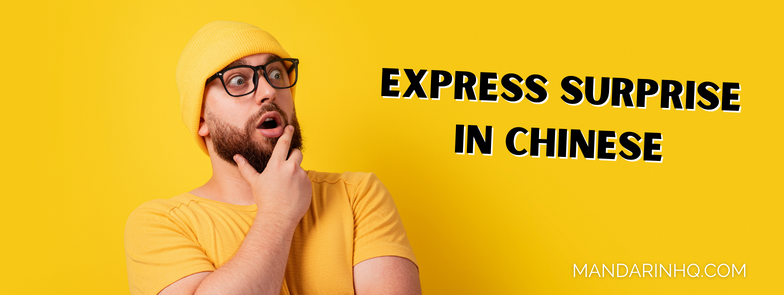"Really?!" "Oh my god!" "No way!"
Just like in English, there are many ways to express surprise in Chinese.
In this lesson you'll learn the exact phrases you need to express surprise in Chinese like a native speaker!
Summary Of "Expressing Surprise" in Chinese From The Video Above
囧 (jiǒng): This character looks like a face and means shocked or embarrassed.
Example:
wǒ wàng le wǒ bà ba de shēng rì.
我忘了我爸爸的生日。
I forgot my dad's birthday.
jiǒng!
囧!
Oops!
哎呀 (āi yā): This is a very common phrase used to express surprise. It’s often used in informal conversations.
Example 1:
āi yā!wǒ de miàn bāo kǎo jiāo le!
哎呀!我的面包烤焦了!
Oh! My bread is burnt!
Example 2:
wǒ lǎo bǎn gěi wǒ jiā gōng zī le.
我老板给我加工资了。
My boss gave me a raise.
āi yā! gōng xǐ gōng xǐ!
哎呀!恭喜恭喜!
Ah! Congratulations!
真的吗? (zhēn de ma?): This is the standard way of saying “really" in Chinese. It’s used when someone is surprised or shocked by something they’ve heard.
In real life spoken Chinese, we often say "真假啊?zhēn jiǎ a?" to express surprise.
Example 1:
wǒ kǎo guò jià zhào le.
我考过驾照了。
I got my driver's license.
zhēn de ma?
真的吗?
Really?
Example 2:
wǒ huái yùn le.
我怀孕了。
I'm pregnant.
zhēn jiǎ a?
真假啊?
Really?
太夸张了 (tài kuā zhāng le): This expression literally means “too exaggerated” and can be translated as "It's so crazy" in English. It is used to express disbelief or surprise when faced with something outrageous or excessive.
Example:
wǒ lǎo gōng kě yǐ zài shí fēn zhōng nèi chī yī bǎi gè hàn bǎo bāo.
我老公可以在十分钟内吃一百个汉堡包。
My husband can eat a hundred hamburgers in ten minutes.
tài kuā zhāng le!
太夸张了!
It's so crazy!
我的天啊 (wǒ de tiān a): This expression means “oh my god” and is a common way to show surprise in Chinese.
Example:
wǒ de tiān a!wǒ zhòng cǎi piào le!
我的天啊!我中彩票了!
Oh my god! I won the lottery!
怎么会这样(zěn me huì zhè yàng): It literally means “how + could + like this”, you can think of it as “How could this happen?” / "How could this be?" in English. We often use it to express surprise, shock, or confusion.
Example:
wǒ de hù zhào diū le.
我的护照丢了。
I lost my passport.
zěn me huì zhè yàng?
怎么会这样?
How could this happen?
不可能(bù kě néng): It means "No way!" and is perfect for expressing disbelief or surprise when something unbelievable has happened.
Example:
nǐ kě yǐ zài yī xiǎo shí nèi xiě wán bào gào ma?
你可以在一小时内写完报告吗?
Can you write that report in an hour?
bù kě néng! wǒ xū yào yī zhōu de shí jiān xiě zhè fèn bào gào.
不可能!我需要一周的时间写这份报告。
No way! I need a week to write this report.
你开玩笑的吧? ! (nǐ kāi wán xiào de ba ? !) : It means "Are you kidding me?!" This is used to express disbelief, surprise, or doubt.
Example:
wǒ bù gàn le!
我不干了!
I quit!
nǐ kāi wán xiào de ba!?
你开玩笑的吧!?
Are you kidding me!?
真奇怪 (zhēn qí guài) : It's weird. / It's strange.
This one is also common in situations where you’re surprised or confused.
Example:
shuí hē le wǒ de kā fēi?zhēn qí guài!
谁喝了我的咖啡?真奇怪!
Who drank my coffee? It's weird!
#10
不可思议 (bù kě sī yì ) : It is a Chinese idiom that translates to "unbelievable" or "incredible". You can use this to show surprise, amazement, or shock.
Example:
tā huā le sān gè yuè de shí jiān xué huì le yī kǒu dì dào de zhōng wén.
他花了三个月的时间学会说一口地道的中文。
It took him three months to learn to speak Chinese like a native.
wa! bù kě sī yì!
哇!不可思议!
Wow! Incredible!
You might also find these posts interesting:

